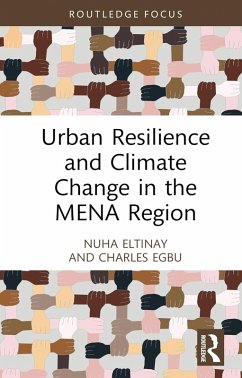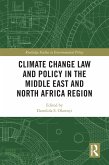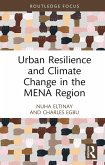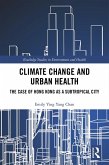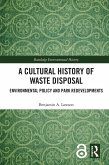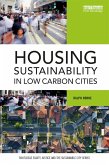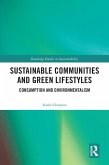22,95 €
22,95 €
inkl. MwSt.
Sofort per Download lieferbar

11 °P sammeln
22,95 €
Als Download kaufen

22,95 €
inkl. MwSt.
Sofort per Download lieferbar

11 °P sammeln
Jetzt verschenken
Alle Infos zum eBook verschenken
22,95 €
inkl. MwSt.
Sofort per Download lieferbar
Alle Infos zum eBook verschenken

11 °P sammeln
- Format: ePub
- Merkliste
- Auf die Merkliste
- Bewerten Bewerten
- Teilen
- Produkt teilen
- Produkterinnerung
- Produkterinnerung

Bitte loggen Sie sich zunächst in Ihr Kundenkonto ein oder registrieren Sie sich bei
bücher.de, um das eBook-Abo tolino select nutzen zu können.
Hier können Sie sich einloggen
Hier können Sie sich einloggen
Sie sind bereits eingeloggt. Klicken Sie auf 2. tolino select Abo, um fortzufahren.

Bitte loggen Sie sich zunächst in Ihr Kundenkonto ein oder registrieren Sie sich bei bücher.de, um das eBook-Abo tolino select nutzen zu können.
This book provides an overview of the geopolitical context and climate change risk profile of the Middle East and North Africa (MENA) Region.
- Geräte: eReader
- mit Kopierschutz
- eBook Hilfe
Andere Kunden interessierten sich auch für
![Climate Change Law and Policy in the Middle East and North Africa Region (eBook, ePUB) Climate Change Law and Policy in the Middle East and North Africa Region (eBook, ePUB)]() Climate Change Law and Policy in the Middle East and North Africa Region (eBook, ePUB)40,95 €
Climate Change Law and Policy in the Middle East and North Africa Region (eBook, ePUB)40,95 €![Urban Resilience and Climate Change in the MENA Region (eBook, PDF) Urban Resilience and Climate Change in the MENA Region (eBook, PDF)]() Nuha EltinayUrban Resilience and Climate Change in the MENA Region (eBook, PDF)22,95 €
Nuha EltinayUrban Resilience and Climate Change in the MENA Region (eBook, PDF)22,95 €![Climate Change and Urban Health (eBook, ePUB) Climate Change and Urban Health (eBook, ePUB)]() Emily Ying Yang ChanClimate Change and Urban Health (eBook, ePUB)42,95 €
Emily Ying Yang ChanClimate Change and Urban Health (eBook, ePUB)42,95 €![A Cultural History of Waste Disposal (eBook, ePUB) A Cultural History of Waste Disposal (eBook, ePUB)]() Benjamin A. LawsonA Cultural History of Waste Disposal (eBook, ePUB)42,95 €
Benjamin A. LawsonA Cultural History of Waste Disposal (eBook, ePUB)42,95 €![Planning Across Borders in a Climate of Change (eBook, ePUB) Planning Across Borders in a Climate of Change (eBook, ePUB)]() Planning Across Borders in a Climate of Change (eBook, ePUB)46,95 €
Planning Across Borders in a Climate of Change (eBook, ePUB)46,95 €![Housing Sustainability in Low Carbon Cities (eBook, ePUB) Housing Sustainability in Low Carbon Cities (eBook, ePUB)]() Ralph HorneHousing Sustainability in Low Carbon Cities (eBook, ePUB)42,95 €
Ralph HorneHousing Sustainability in Low Carbon Cities (eBook, ePUB)42,95 €![Sustainable Communities and Green Lifestyles (eBook, ePUB) Sustainable Communities and Green Lifestyles (eBook, ePUB)]() Tendai ChitewereSustainable Communities and Green Lifestyles (eBook, ePUB)48,95 €
Tendai ChitewereSustainable Communities and Green Lifestyles (eBook, ePUB)48,95 €-
-
-
This book provides an overview of the geopolitical context and climate change risk profile of the Middle East and North Africa (MENA) Region.
Hinweis: Dieser Artikel kann nur an eine deutsche Lieferadresse ausgeliefert werden.
Dieser Download kann aus rechtlichen Gründen nur mit Rechnungsadresse in A, B, BG, CY, CZ, D, DK, EW, E, FIN, F, GR, HR, H, IRL, I, LT, L, LR, M, NL, PL, P, R, S, SLO, SK ausgeliefert werden.
Hinweis: Dieser Artikel kann nur an eine deutsche Lieferadresse ausgeliefert werden.
Produktdetails
- Produktdetails
- Verlag: Taylor & Francis eBooks
- Seitenzahl: 126
- Erscheinungstermin: 12. Januar 2024
- Englisch
- ISBN-13: 9781040007105
- Artikelnr.: 69693053
- Verlag: Taylor & Francis eBooks
- Seitenzahl: 126
- Erscheinungstermin: 12. Januar 2024
- Englisch
- ISBN-13: 9781040007105
- Artikelnr.: 69693053
- Herstellerkennzeichnung Die Herstellerinformationen sind derzeit nicht verfügbar.
Nuha Eltinay is an award-winning spatial planner, a PhD holder in urban resilience from London South Bank University (LSBU), and a master's degree holder in international planning and sustainable development from the University of Westminster, London. In her current role as Senior Expert in Urban Resilience and Climate Adaptation at ICLEI Local Governments for Sustainability (European Secretariat), she leads activities of project management, consultations, and acquisition in sustainable urban development, Ukraine post-war recovery, climate adaptation financing, and urban resilience assessments at cities, local communities and EU regional governments level.
Charles Egbu is Vice Chancellor, Leeds Trinity University. Prior to UEL, he was formerly Pro-Vice Chancellor (Education & Experience) at the University of East London, UK, and former Dean of School of the Built Environment and Architecture at London South Bank University, England, where he also holds the chair in project management and strategic management in construction. Professor Egbu has over 25 years of experience in higher education, has written 12 books, and has lectured nationally and internationally in areas such as sustainable development, resilient communities, construction economics, and innovation and knowledge management in complex environments.
Charles Egbu is Vice Chancellor, Leeds Trinity University. Prior to UEL, he was formerly Pro-Vice Chancellor (Education & Experience) at the University of East London, UK, and former Dean of School of the Built Environment and Architecture at London South Bank University, England, where he also holds the chair in project management and strategic management in construction. Professor Egbu has over 25 years of experience in higher education, has written 12 books, and has lectured nationally and internationally in areas such as sustainable development, resilient communities, construction economics, and innovation and knowledge management in complex environments.
ACKNOWLEDGMENTS. 2 DECLARATION.. 2 ABSTRACT.. 5 Chapter 1: MENA Regional Context - Impact of Climate Change. 5 1.1 Background and Geographical Context - Urban Risk Profile. 5 1.2 Climate Change - Mitigation and Adaptation. 5 1.3 Climate Change and Human Security. 5 Chapter 2: Drivers of Climate Risk - Vulnerabilities. 5 2.1 Urbanisation of Poverty. 5 2.2 Decentralisation and Urban Governance. 5 2.3 Fragility and Political Instability. 5 Chapter 3: Urban Resilience - Conceptual Framework. 5 3.1 Definition of Resilience. 5 3.2 Resilience of What and to What? 5 3.3 Dynamics of Resilience (Exposure, Risk, and Vulnerability) 5 Chapter 4: Measuring Urban Resilience. 5 4.1 Assessments of Urban Resilience. 5 4.2 Measuring Urban Resilience. 5 4.3 Building Urban Resilience. 5 4.4 Measures of Climate Change Mitigation and Adaptation. 5 Chapter 5: Monitoring Urban Resilience. 6 5.1 Data: Multi Hazard Early Warning Systems (MHEWS) and Climate Information. 6 5.2 Urban Resilience Governance: Disaster Risk Reduction Policies and Local Capacities. 6 5.3 Decision-Making: Urban Resilience Action Planning (U-RAP) and Policy Formulation. 6 Chapter 6: Adaptation to Climate Change - Financing Urban Resilience. 6 6.1 The Gap in Financing for Urban Resilience and Climate Change Adaptation (CCA). 6 6.2 Assessments of Climate Risk and Fiscal Risk Management 6 6.3 Adaptive, Absorptive and Transformative Capacity Building. 6 Chapter 7: Urban Resilience Governance - Key Stakeholders in Climate Change Adaptation (CCA) and Disaster Risk Reduction (DRR) 6 7.1 Definition of Key Stakeholders - Characteristics, Roles, and Responsibilities. 6 7.2 Mapping DRR and CCA Key Stakeholders. 6 7.3 Dynamics of Key Stakeholder Engagement 6 Chapter 8: Urban Resilience - Opportunities and Constraints for Adaptation to Climate Change. 6 8.1 Monitoring Protracted Displacement 6 8.2 Protracted Displacement in the MENA Region. 6 8.3 Property Rights - Land Tenure. 6 8.4 Displacement Durable Solutions 6 Chapter 9: Way Forward - From COP27 to COP28. 7
9.1 The 27th Session of the Conference of the Parties (COP27) - Historical Overview of Global Targets and Commitments. 7
9.2 MENA Region - Climate Change Mitigation, Adaptation, and Financing. 7
9.3 Policy Recommendations and Actions - COP28. 7 Index
9.1 The 27th Session of the Conference of the Parties (COP27) - Historical Overview of Global Targets and Commitments. 7
9.2 MENA Region - Climate Change Mitigation, Adaptation, and Financing. 7
9.3 Policy Recommendations and Actions - COP28. 7 Index
ACKNOWLEDGMENTS. 2 DECLARATION.. 2 ABSTRACT.. 5 Chapter 1: MENA Regional Context - Impact of Climate Change. 5 1.1 Background and Geographical Context - Urban Risk Profile. 5 1.2 Climate Change - Mitigation and Adaptation. 5 1.3 Climate Change and Human Security. 5 Chapter 2: Drivers of Climate Risk - Vulnerabilities. 5 2.1 Urbanisation of Poverty. 5 2.2 Decentralisation and Urban Governance. 5 2.3 Fragility and Political Instability. 5 Chapter 3: Urban Resilience - Conceptual Framework. 5 3.1 Definition of Resilience. 5 3.2 Resilience of What and to What? 5 3.3 Dynamics of Resilience (Exposure, Risk, and Vulnerability) 5 Chapter 4: Measuring Urban Resilience. 5 4.1 Assessments of Urban Resilience. 5 4.2 Measuring Urban Resilience. 5 4.3 Building Urban Resilience. 5 4.4 Measures of Climate Change Mitigation and Adaptation. 5 Chapter 5: Monitoring Urban Resilience. 6 5.1 Data: Multi Hazard Early Warning Systems (MHEWS) and Climate Information. 6 5.2 Urban Resilience Governance: Disaster Risk Reduction Policies and Local Capacities. 6 5.3 Decision-Making: Urban Resilience Action Planning (U-RAP) and Policy Formulation. 6 Chapter 6: Adaptation to Climate Change - Financing Urban Resilience. 6 6.1 The Gap in Financing for Urban Resilience and Climate Change Adaptation (CCA). 6 6.2 Assessments of Climate Risk and Fiscal Risk Management 6 6.3 Adaptive, Absorptive and Transformative Capacity Building. 6 Chapter 7: Urban Resilience Governance - Key Stakeholders in Climate Change Adaptation (CCA) and Disaster Risk Reduction (DRR) 6 7.1 Definition of Key Stakeholders - Characteristics, Roles, and Responsibilities. 6 7.2 Mapping DRR and CCA Key Stakeholders. 6 7.3 Dynamics of Key Stakeholder Engagement 6 Chapter 8: Urban Resilience - Opportunities and Constraints for Adaptation to Climate Change. 6 8.1 Monitoring Protracted Displacement 6 8.2 Protracted Displacement in the MENA Region. 6 8.3 Property Rights - Land Tenure. 6 8.4 Displacement Durable Solutions 6 Chapter 9: Way Forward - From COP27 to COP28. 7
9.1 The 27th Session of the Conference of the Parties (COP27) - Historical Overview of Global Targets and Commitments. 7
9.2 MENA Region - Climate Change Mitigation, Adaptation, and Financing. 7
9.3 Policy Recommendations and Actions - COP28. 7 Index
9.1 The 27th Session of the Conference of the Parties (COP27) - Historical Overview of Global Targets and Commitments. 7
9.2 MENA Region - Climate Change Mitigation, Adaptation, and Financing. 7
9.3 Policy Recommendations and Actions - COP28. 7 Index
